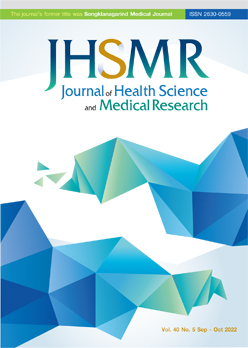Comparison Accuracy in mSIRS, NEWS and qSOFA Score to Triage Sepsis Patients in The Emergency Department at a Hospital in Thailand
DOI:
https://doi.org/10.31584/jhsmr.2022859Keywords:
Emergency Department, NEWS score, SOFA score, Triage sepsisAbstract
Objective: We aimed to apply the modified systemic inflammatory response syndrome (mSIRS), the quick sequential organ failure assessment score (qSOFA), and National Early Warning Score (NEWS) to triage suspected sepsis patients. Therefore, knowing the predictive performance of each scoring system, using given cut-points for triaging patients with suspected sepsis, could help predict the progression of sepsis.
Material and Methods: This study is a single-center retrospective chart review. The study enrolled patients older than 18 years with suspected sepsis patient at the time they presented at the triage zone. The primary outcome was to determine which scoring system were the most accurate to triage sepsis patients. The secondary outcomes were predictions of mortality related to the scoring.
Results: Considering the outcome to be represented by a SOFA score of ≥2, the area under the curve of the receiver operating characteristic curves for the entire range of mSIRS, qSOFA and NEWS were 0.494, 0.669 and 0.751, respectively. Using a cut point for qSOFA of ≥2 provided a low sensitivity of 36.2% and high specificity of 93.0%; whereas, using a cut point for NEWS of >4 provided a high sensitivity of 89.0% and low specificity of 33.0%.
Conclusion: In summary, qSOFA is the most accurate scoring system for diagnosis sepsis which was consistent with previous study. However, qSOFA had the lowest sensitivity, so is not appropriate in a triage situation. Therefore, we decided to use NEWS as the triage tool because of its better sensitivity and acceptable specificity as we need to triage almost all possible cases.
References
Singer M, Deutschman CS, Seymour CW, Shankar-Hari M, Annane D, Bauer M, et al. The third international consensus definitions for sepsis and septic shock (Sepsis-3). JAMA 2016;315:801-10.
Seymour CW, Liu V, Iwashyna TJ, Frank MB, Thomas DR, Andre S, et al. Assessment of clinical criteria for sepsis. JAMA 2016;315:762-74.
Haydar S, Spanier M, Weems P, Wood S, Strout T. Comparison of qSOFa and SIRS criteria as a screening mechanism for emergency department sepsis. Am J Emerg Med 2017;35: 1730-3.
Song JU, Sin CK, Park HK, Shim SR, Lee J. Performance of the quick Sequential (sepsis-related) Organ Failure Assessment score as a prognostic tool in infected patients outside the intensive care unit; a systematic review and meta-analysis. Crit Care 2018;22:28.
Maitra S, Som A, Bhattacharjee S. Accuracy of quick sequential organ failure assessment (qSOFA) score and systemic inflammatory response syndrome (SIRS) criteria for predicting mortality in hospitalized patients with suspected infection: a meta-analysis of observational studies. Clin Microbiol Infect 2018;24:1123-9.
Finfer S, Bellomo R, Lipman J, French C, Dobb G, Myburgh J. Adult-population incidence of severe sepsis in Australian and New Zealand intensive care units. Intensive Care Med 2004; 30:589-96.
Martin GS, Mannino DM, Eaton S, Moss M. The epidemiology of sepsis in the United States from 1979 through 2000. N Eng J Med 2003;348:1546-54.
Vincent JL, Opal SM, Marshall JC, Tracey KJ. Sepsis definitions: time for change. Lancet 2013; 381:774-5.
Bozza FA, Carnevale R, Japiassú AM, Castro-Faria-Neto HC, Angus DC, Salluh JI. Early fluid resuscitation in sepsis: evidence and perspectives. Shock 2010;34(Suppl 1):40-3.
Westphal GA, Koenig Á, CaldeiraFilho M, Feijó J, de Oliveira LT, Nunes F, et al. Reduce mortality after the implementation of a protocol for early detection of sepsis. J Crit Care 2011;26: 76-81.
Liu VX, Fieling-Singh V, Greene JD, Baker JM, Iwashyna TJ, Bhattacharya, et al. The timing of early antibiotics and hospital mortality in sepsis. Am J RespirCrit Care Med 2017;196:856- 63.
Raith EP, Udy AA, Bailey M, McGloughlin S, MacIsaac C, Bellomo R, et al. Prognostic accuracy of the SOFA score, SIRS criteria, and qSOFA score for in-hospital mortality among adults with suspected infection admitted to the intensive care unit. JAMA 2017;317:290-300.
Askim Å, Moser F, Gustad LT, Stene H, Gundersen M, Åsvold OB,et al. Poor performance of quick-SOFA (qSOFA) score in predicting severe sepsis and mortality – a prospective study of patients admitted with infection to the emergency department. Scand J Trauma Resusc Emerg Med 2017;25:56.
McLymont N, Glover GW. Scoring systems for the characterization of sepsis and associated outcomes. Ann Transl Med 2016;4:527.
Matthew MC, Ashley S, Xuan H, Sarah S, Natasha P, Michael DH, et al. Quick sepsis-related organ failure assessment, systemic inflammatory response syndrome, and early warning scores for detecting clinical deterioration in infected patients outside the Intensive Care Unit. Am J Respir Crit Care Med 2017;195:906-11.
Corfield AR, Lees F, Zealley I, Houston G, Dickie S, Ward K, et al. Utility of a single early warning score in patients with sepsis in the emergency department. Emerg Med J 2014;31: 482-7.
Downloads
Published
How to Cite
Issue
Section
License
Copyright (c) 2023 Prince of Songkla University, Thailand

This work is licensed under a Creative Commons Attribution-NonCommercial-NoDerivatives 4.0 International License.
























